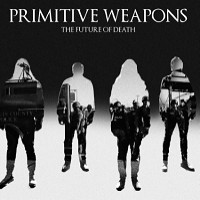If there is one thing typical about Primitive Weapons, it’s their pedigree. As with many bands gaining success in the New York boroughs, the members of this Brooklyn-based outfit boast a rather impressive resume of former bands, nearly all of which were from Long Island. But their roots in Mind Over Matter, On the Might of Princes, and Error-Type: 11 aside, Primitive Weapons have come to pack quite the noisy punch on their latest full length, The Future of Death.
As a complete release, The Future of Death is very truly an unrelenting and unceasing barrage of dissonant heavy music. The Primitive Weapons gents are most definitely a genre-defying bunch, and that’s one of their greatest strengths. The record not only doesn’t let off the gas even in its slower moments, but it also doesn’t once pigeon-hole itself to a particular sound. In fact it’s more of a showcase of influences ranging from the metal-hardcore bombast of Converge, to the mid-90’s post-hardcore melody of Shift and Quicksand, and even to the more jarring sound of Seattle’s Botch. Yes, they are that diverse in sound. But enough with the comparisons (for now) and back to The Future of Death itself.
The most impressive element of the record is the guitar work. Given Shepherd’s veteran history in the musical underground, a high level of song-writing was expected but the quality on the guitar tracks left me nonetheless extremely impressed. The opening riffs to “The Electric Drama,†my favorite track on the record, pound with great force and only serve to segue into an even more energetic and driving guitar line through the song’s verses. “Age of Denial†furthers pushes the needle on simply well-written heavy riffs on the record. On The Future of Death, Shepherd has very much harnessed a sound laden with octave-rich melody and heaviness.
And that’s not to say the rest of Primitive Weapons are any less impressive. Dave Castillo’s vocal range is similarly striking throughout the record. The foundation of his vocals is a high-pitched scream consistent with Deadguy or VOD. But it’s in his less present singing that Castillo brings a greater dimension to The Future of Death. The record’s third track, “Panoptycon Blues,†is the best showcase of his range and left me with distinct recollections of Baroness’s John Baizley and even Trent Reznor. To be clear, Castillo goes a long way in bringing the band’s music together and he does so with both aggression and musicality.
The Future of Death was my introduction to Primitive Weapons. And as it isn’t the band’s first release, it has the feel of a veteran musicianship. It’s urgent and well-written. And it feels like a record made by those who are comfortable enough to seek irreverence over the same-old-stuff. The Future is Death is a complete record in that sense and it rocks with compellingly great heaviness.
